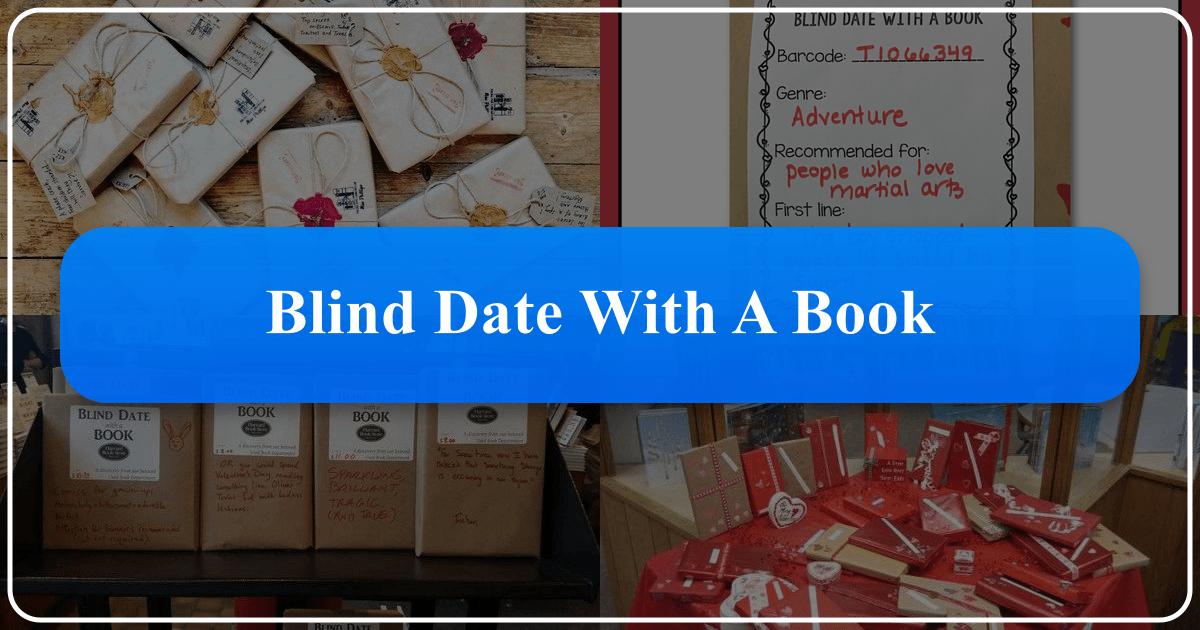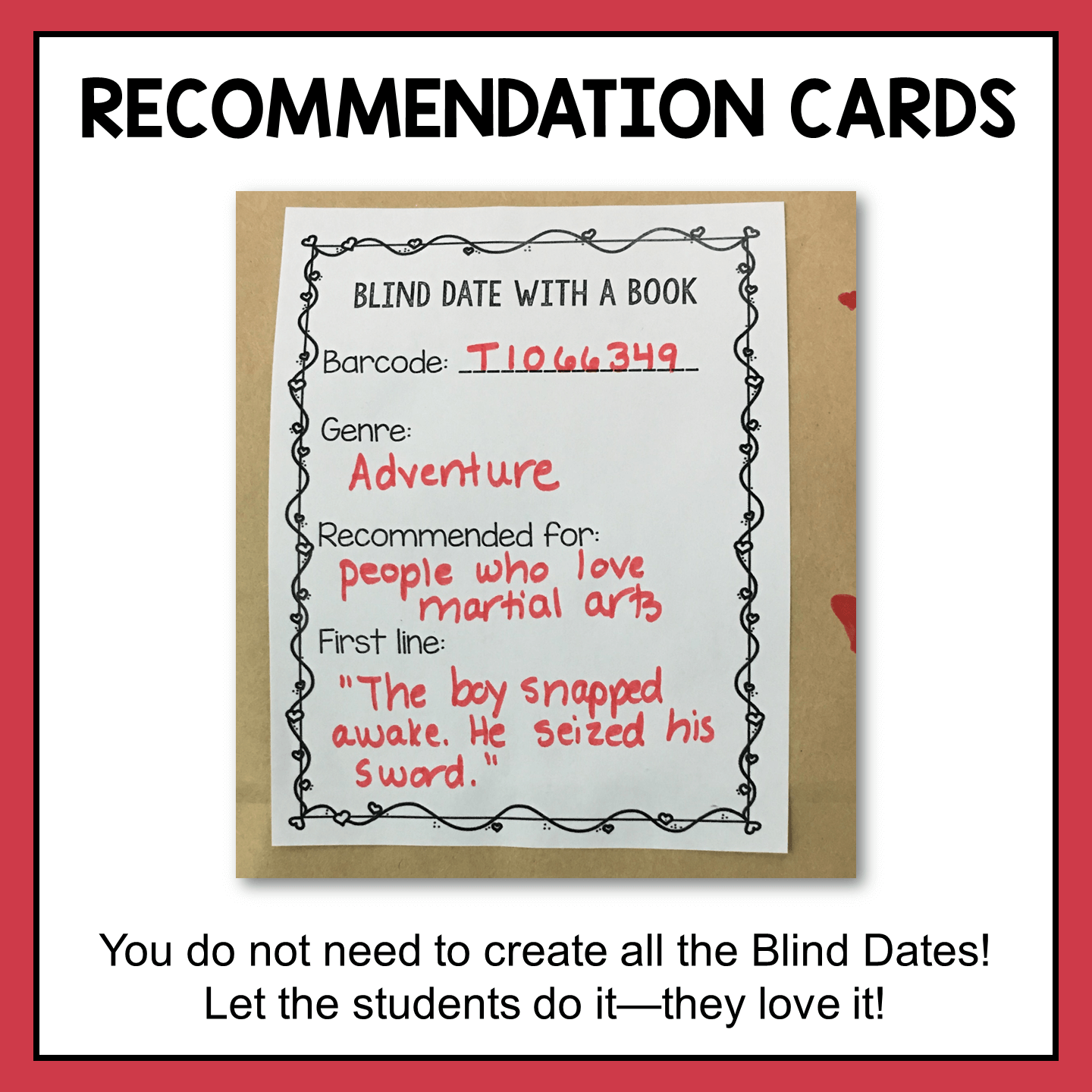A Blind Date With a Book: Unwrapping the Joy of Serendipitous Reading

The thrill of discovery, the unexpected twist, the sheer delight of stumbling upon a hidden gem – these are the hallmarks of a good blind date. But what if that date wasn’t with a person, but with a book? The concept of a “blind date with a book” offers a unique and exciting approach to reading, injecting a playful element of chance into the often deliberate process of selecting our next literary adventure. This exploration delves into the diverse facets of this intriguing concept, examining its appeal, its practical applications, and its broader implications for the world of reading and literature.
The Allure of the Unknown: Why Blind Dates with Books Work

The modern reader is often overwhelmed with choice. Endless lists of bestsellers, a dizzying array of genres, and personalized recommendations can lead to analysis paralysis. The “blind date with a book” elegantly circumvents this problem by embracing the unknown. It taps into our inherent curiosity and our love of surprise. By relinquishing control over the selection process, we open ourselves up to a potential discovery that might never have occurred through conventional means.
This element of chance is particularly appealing in a world dominated by algorithms and curated content. A blind date with a book allows for a genuine, unscripted encounter with literature, fostering a sense of spontaneity and adventure often missing from our carefully planned digital lives. It’s a refreshing return to the simple pleasure of serendipity, allowing readers to connect with books in a more organic and less calculated way. The anticipation of unveiling the mystery, of unwrapping a book chosen not by personal preference but by fate, adds an element of excitement to the reading experience itself.

Expanding Literary Horizons: Beyond Your Comfort Zone
One of the most significant benefits of a blind date with a book lies in its potential to broaden literary horizons. Readers often gravitate towards familiar genres and authors, creating a comfort zone that can limit exposure to new and potentially enriching experiences. The blind date format, however, forces us to step outside these boundaries, encouraging us to engage with different writing styles, narrative structures, and perspectives. This can lead to the discovery of new favorite authors, genres, or even entire literary movements that we might have otherwise overlooked. The surprise element acts as a catalyst for exploration, fostering a sense of intellectual curiosity and expanding our understanding of the diverse tapestry of literature.

Fostering Community and Shared Experiences: The Social Aspect of Blind Dates
The “blind date with a book” concept is not solely confined to individual reading experiences. It also lends itself beautifully to the creation of vibrant reading communities. Libraries, bookstores, and even online forums can organize events where participants receive a wrapped book, creating a shared experience of anticipation and discovery. Post-date discussions, comparing notes on the chosen books, provide opportunities to engage in stimulating literary conversations, fostering connections between readers with diverse tastes and preferences. These shared experiences enhance the overall enjoyment of the process, transforming a solitary activity into a dynamic and socially engaging one.
Practical Applications: Implementing a Blind Date with a Book
The practical implementation of a “blind date with a book” can vary widely depending on the context. Libraries, for instance, can curate collections specifically for blind date events, selecting titles based on genre, age appropriateness, and overall quality. These selections can be further categorized with suggestive labels to provide a hint about the book’s contents without revealing the title or author. This is a particularly effective strategy for children’s literature, where age appropriateness is a paramount consideration.
Bookstores can also participate by organizing similar events, providing a unique marketing opportunity to attract new customers and encourage readers to experiment with different genres. Online retailers can create digital versions of the blind date experience, offering curated selections of eBooks with limited information about the content. This approach could even leverage user data to provide more personalized “blind dates” while still preserving the element of surprise.
The wrapping of the books, often with creative and engaging labels, is a crucial part of the experience. Simple brown kraft paper or colorful wrapping paper can be used to package the books, with intriguing phrases or suggestive imagery adding to the anticipation. The inclusion of additional small gifts such as bookmarks, highlighters, or even handwritten notes can further enhance the appeal and elevate the overall presentation. This level of care in the presentation contributes to the sense of occasion, elevating the experience from a simple book selection to a thoughtful and enjoyable event.
Curating the Collection: A Balancing Act
Creating a successful “blind date with a book” experience necessitates careful curation of the book collection. The selected titles should represent a diverse range of genres, styles, and authors, ensuring that every participant has the opportunity to discover something new and engaging. While the goal is surprise, the quality of the chosen books should be paramount. Using a rating system like Goodreads can help to ensure a consistently positive reading experience. In the case of children’s books, age appropriateness and the suitability of the content are critical considerations. Striking a balance between variety, quality, and appropriateness is essential for creating a memorable and enjoyable blind date.
Promoting the Event: Generating Excitement
The success of a blind date with a book also hinges on effective promotion. Libraries and bookstores can use various marketing strategies, such as posters, social media campaigns, and press releases, to generate excitement and attract participants. Online platforms can leverage targeted advertising and social media engagement to reach a broader audience. Clearly communicated guidelines about the process, including the selection criteria and the format of the “blind date,” are crucial for ensuring a smooth and satisfying experience for all involved. Generating a sense of anticipation and excitement through engaging visuals and persuasive messaging can significantly enhance the overall success of the event.
The Cultural Impact: Blind Dates and the Future of Reading
The enduring popularity of “blind date with a book” events speaks to a deeper cultural need. In an era of instant gratification and algorithmic control, the inherent unpredictability of this approach offers a refreshing counterpoint. It underscores the intrinsic value of serendipitous discovery, reminding us of the joy of unexpected encounters and the power of chance to shape our lives. This element of spontaneity challenges the often-structured and controlled nature of our interactions with media and information.
Furthermore, the communal aspect of blind date events strengthens the bonds of reading communities, fostering dialogue and encouraging readers to connect with one another on a shared intellectual plane. These events can be especially valuable in libraries and schools, providing opportunities for intergenerational engagement and creating a sense of collective excitement about reading. By encouraging exploration and fostering a sense of community, blind dates with books have the potential to revitalize our approach to reading and to deepen our appreciation of literature in a way that resonates with our contemporary cultural landscape.
Expanding Access to Literature: Libraries and Digital Resources
The “blind date with a book” concept can also play a significant role in expanding access to literature. Libraries, with their vast collections and community-based approach, are ideally positioned to organize and promote these events. They can provide opportunities for readers of all ages and backgrounds to experience the thrill of serendipitous discovery, particularly those who might not otherwise have access to a wide range of literary resources. Similarly, digital platforms can leverage the concept to reach readers who primarily engage with electronic media. By embracing the possibilities offered by both physical and digital formats, blind dates with books can serve as a powerful tool for broadening literary access.
Celebrating Serendipity: The Enduring Appeal of the Unexpected
In a world increasingly shaped by algorithms and personalized recommendations, the “blind date with a book” provides a refreshing counterpoint. It’s a celebration of serendipity, a reminder that some of our most rewarding discoveries are made unexpectedly. The simple act of choosing a book without knowing its contents encourages us to be open to new possibilities, to step outside our comfort zones, and to embrace the sheer delight of the unknown. This is a powerful message, not only for avid readers, but for anyone seeking joy and excitement in the everyday. The continued popularity of “blind date with a book” events suggests that the appeal of serendipity, the thrill of the unexpected, remains a powerful force in our increasingly controlled and predictable world. The unexpected joy of discovery that a blind date with a book offers provides a refreshing counterpoint to the often overly curated and personalized reading experiences of the modern era.